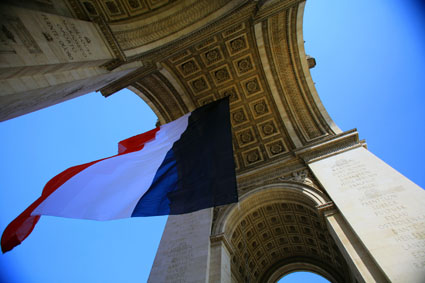
© ATOUT FRANCE/Franck Charel
french culture
some cultural differences
Culture is what identifies one nation from another, surely?
I was once asked why as a travel writer I specialised in just one country. I replied that firstly it was because I loved the country, secondly that it was because if I spent all my time travelling to different countries, all I would understand in any depth was how to travel.
Finally, I said, by specialising, I was able to get into the heart and soul of the country, to get to know it in depth, not superficially, as any fleeting visit only allows. Sure, in two intense days, you can learn a lot about the Louvre in Paris, but that doesn't tell you much about Paris, or the rest of France.
The French Language
As it should be with any nation, the French are proud of their language; it is soft and flowing, even if, in some parts of France, it seems to flow over very rough pebbles lodged in the back of the larynx.
Don’t believe anyone who tells you that English is widely spoken in France. Why should it be? I can't recall any time when, back in England, a visitor has come up to me and spoke in French, expecting me to understand and reply in French, or German or Dutch. So, why should we expect French people to understand and speak in English. Of course, while the command of a number of languages is evident in the major cities, especially among those in the tourist service industry, it is most definitely not the case in small villages and rural areas; find yourself having lunch in some rural auberge and it's likely to be French all the way.
In all major tourists spots, however, you will find that English is spoken by someone, and, to be fair to the excellent French educational system, French children start learning foreign languages, particularly English, from an early age.
So what do you do if you don’t speak the language?
Well, the daftest advice I ever saw was 'Stay in the major tourist areas'; if all you're going to do is hang around the centre of the cities, why bother going to the country in the first place? Be adventurous, go beyond the tourist resorts, take a phrase book and try. Even if you sound awful, the French people will appreciate the effort and invariably help you out.
But the most important thing in all of this is to start with 'Bonjour, Madame/Monsieur'. It's polite to greet someone you are about to ask for help or a service...and that includes the taxi driver, the market trader...anyone.
And here's a 'Top Tip': when ordering in a restaurant, however badly you pronounce things, listen, immediately...more often than not the waiter will repeat your order, correctly pronounced...learn from that.
Person-to-person customs
As with any culture there are customs and ways of behaving that are unique to France. Good food is important, the family is important, and there are ways to behave and comport yourself. For example, during my time with my French girlfriend's family I was told that on being introduced to a woman, I must not extend my hand in expectation of shaking hands; it was for the woman to decide whether she wanted to shake hands. If she did, she would reach out, I would take her hand and say 'Enchanté.' I'm told that this is now not the case, but, for me, old habits die hard...and I guess this is a very old habit these days.
Watch friends and acquaintances when they meet; invariably the new arrival will shake hands with all the men in the group that they know, and kiss all the ladies. It's a form of politeness that is most endearing about the French; it may take a while to get round to greeting everyone, but that's the way it is.
And what about kissing? The cheek-to-cheek kiss, of course, is exercised only among people you know, not with strangers you are meeting for the first time. Touch lightly cheek-to-cheek and air kiss for those you don't know well; lightly kiss cheeks with those you do know. How many times you kiss varies, and I always get it wrong, since it changes from two kisses to four depending on the part of France you are in. Just watch others, to get a clue. And I'm told that you always go to the left cheek first; but I'm never clear whether it's my left or their left, or whether it matters anyway...I think it does, I must pay more attention.
Feminism
There is no 'Ms.' in France. You are 'Mademoiselle' (Mam-zell) if you are single, even if you are 90, or 'Madame' if you are married. Legally, women are equal to men.
Regional cultures
Each region has its own unique traditions, and the country has a unifying customs that permeates all the provinces. For example, Brittany is one of six Celtic nations. Here, the original language is Breton, which is similar to Welsh and Gaelic, too, and is still spoken in certain parts of Brittany. It is very evident in the names of the villages.
In south-west France, in the Pyrénées-Atlantiques, the Basque culture is prominent. The language spoken is second to French. It is a group that holds a strong separate identity.

© ATOUT FRANCE/Nathalie Baetens
This website was built using Site Build It!
SEARCH THIS WEBSITE








